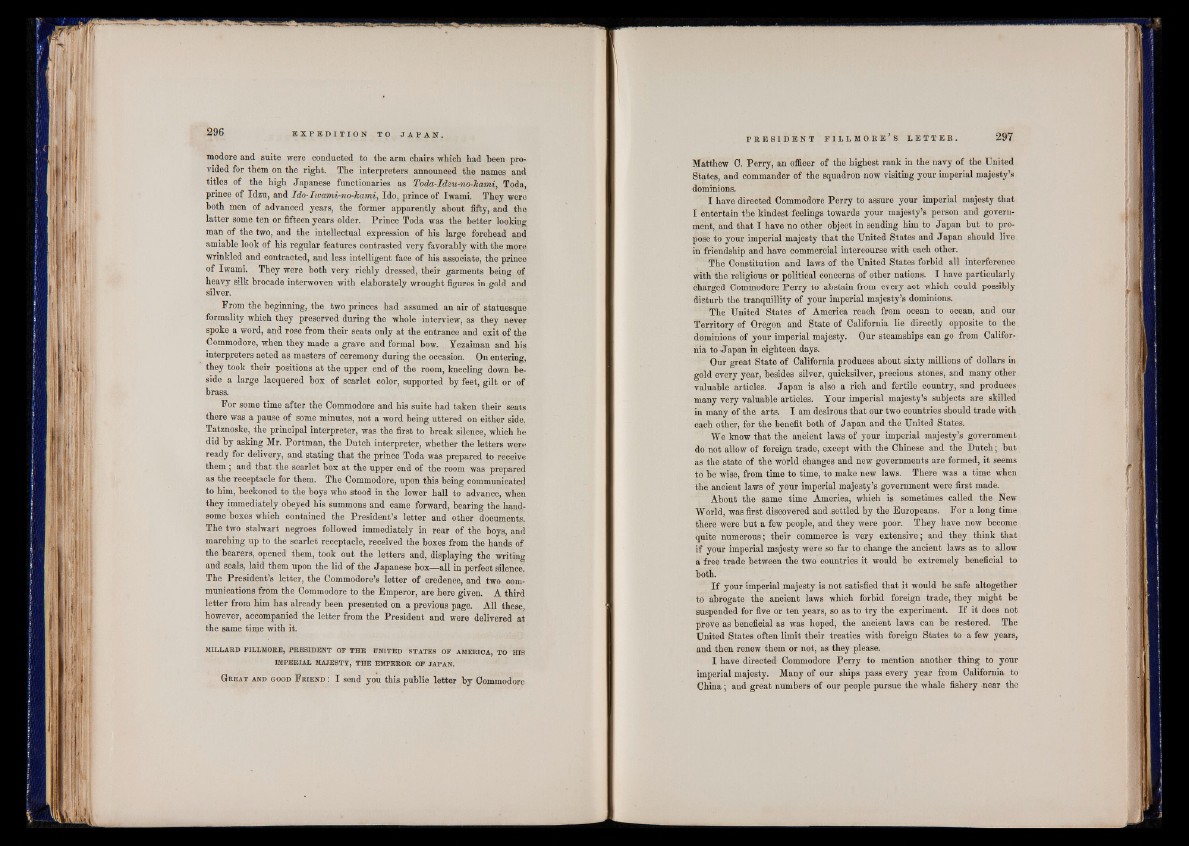
modore and suite were conducted to the arm chairs which had been provided
for them on the right. The interpreters announced the names and
titles of the high Japanese functionaries as Toda-Idzu-no-kami, Toda,
prince of Idzu, and Ido-Iwami-no-kami, Ido, prince of Iwami. They were
both men of advanced years, the former apparently about fifty, and the
latter some ten or fifteen years older. Prince Toda was the better looking
man of the two, and the intellectual expression of his large forehead and
amiable look of his regular features contrasted very favorably with the more
wrinkled and contracted, and less intelligent face of his associate, the prince
of Iwami. They were both very richly dressed, their garments being of
heavy silk brocade interwoven with elaborately wrought figures in gold and
silver.
Prom the beginning, the two princes had assumed an air of statuesque
formality which they preserved during the whole interview, as they never
spoke a word, and rose from their seats only at the entrance and exit of the
Commodore, when they made a grave and formal bow. Yezaiman and his
interpreters acted as masters of ceremony during the occasion. On entering,
they took their positions at the upper end of the room, kneeling down beside
a large lacquered box of scarlet color, supported by feet, gilt or of
brass.
Por some time after the Commodore and his suite had taken their seats
there was a pause of some minutes, not a word being uttered on either side.
Tatznoske, the principal interpreter, was the first to break silence, which he
did by asking Mr. Portman, the Dutch interpreter, whether the letters were
ready for delivery, and stating that the prince Toda was prepared to receive
them: and that the scarlet box at the upper end of the room was prepared
as the receptacle for them. The Commodore, upon this being communicated
to him, beckoned to the hoys who stood in the lower hall to advance, when
they immediately obeyed his summons and came forward, bearing the handsome
boxes which contained the President’s letter and other documents.
The two stalwart negroes followed immediately in rear of the boys, and
marching up to the scarlet receptacle, received the boxes from the hands of
the bearers, opened them, took out the letters and, displaying the writing
and seals, laid them upon the lid of the Japanese box—all in perfect silence.
The President’s letter, the Commodore’s letter of credence, and two communications
from the Commodore to the Emperor, are here given. A third
letter from him has already been presented on a previous page. All these
however, accompanied the letter from the President and were delivered at
the same time with it.
MILLARD FILLMORE, PRESIDENT OP THE UNITED STATES OF AMERICA, TO HIS
IMPERIAL MAJESTY, THE EMPEROR OP JAPAN.
G r e a t a n d g o o d F r ie n d : I send you this public letter by Commodore
Matthew C. Perry, an officer of the highest rank in the navy of the United
States, and commander of the squadron now visiting your imperial majesty’s
dominions.
I have directed Commodore Perry to assure your imperial majesty that
I entertain the kindest feelings towards your majesty’s person and government,
and that I have no other object in sending him to Japan but to propose
to your imperial majesty that the United States and Japan should live,
in friendship and have commercial intercourse with each other.
The Constitution and laws of the United States forbid all interference
with the religious or political concerns of other nations. I have particularly
charged Commodore Perry to abstain from every act which could possibly
disturb the tranquillity of your imperial majesty’s dominions.
The United States of America reach from ocean to ocean, and our
Territory of Oregon and State of California lie directly opposite to the
dominions of your imperial majesty. Our steamships can go from California
to Japan in eighteen days.
Our great State of California produces about sixty millions of dollars in
gold every year, besides silver, quicksilver, precious stones, and many other
valuable articles. Japan is also a rich and fertile country, and produces
many very valuable articles. Your imperial majesty’s subjects are skilled
in many of the arts. I am desirous that our two countries should trade with
each other, for the benefit both of Japan and the United States.
We know that the ancient laws of your imperial majesty’s government
do not allow of foreign trade, except with the Chinese and the Dutch; hut
as the state of the world changes and new governments are formed, it seems
to be wise, from time to time, to make new laws. There was a time when
the ancient laws of your imperial majesty’s government were first made.
About the same time America, which is sometimes called the New
World, was first discovered and.settled by the Europeans. For a long time
there were but a few people, and they were poor. They have now become
quite numerous; their commerce is very extensive; and they think that
if your imperial majesty were so far to change the ancient laws as to allow
a free trade between the two countries it would he extremely beneficial to
both.
If your imperial majesty is not satisfied that it would be safe altogether
to abrogate the ancient laws which forbid foreign trade, they might be
suspended for five or ten years, so as to try the experiment. I f it does not
prove as beneficial as was hoped, the ancient laws can be restored. The
United States often limit their treaties with foreign States to a few years,
and then renew them or not, as they please.
I have directed Commodore Perry to mention another thing to your
imperial majesty. Many of our ships pass every year from California to
China; and great numbers of our people pursue the whale fishery near the